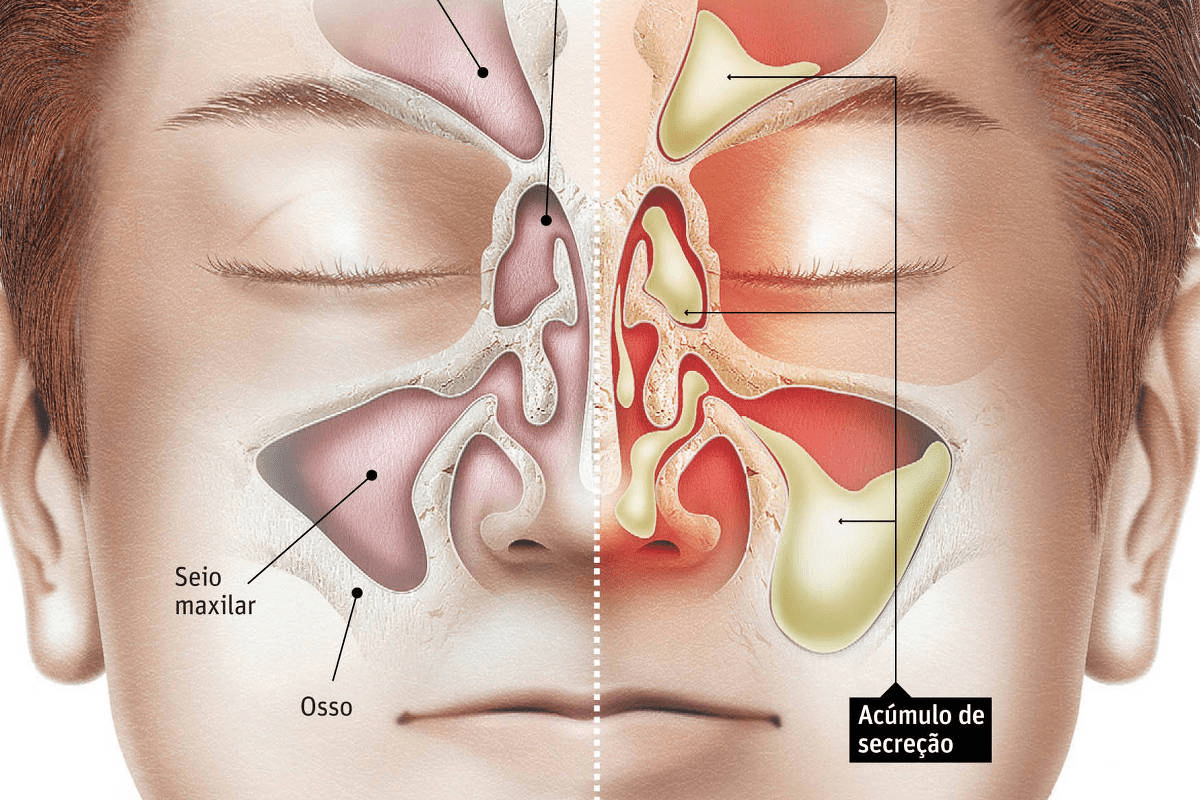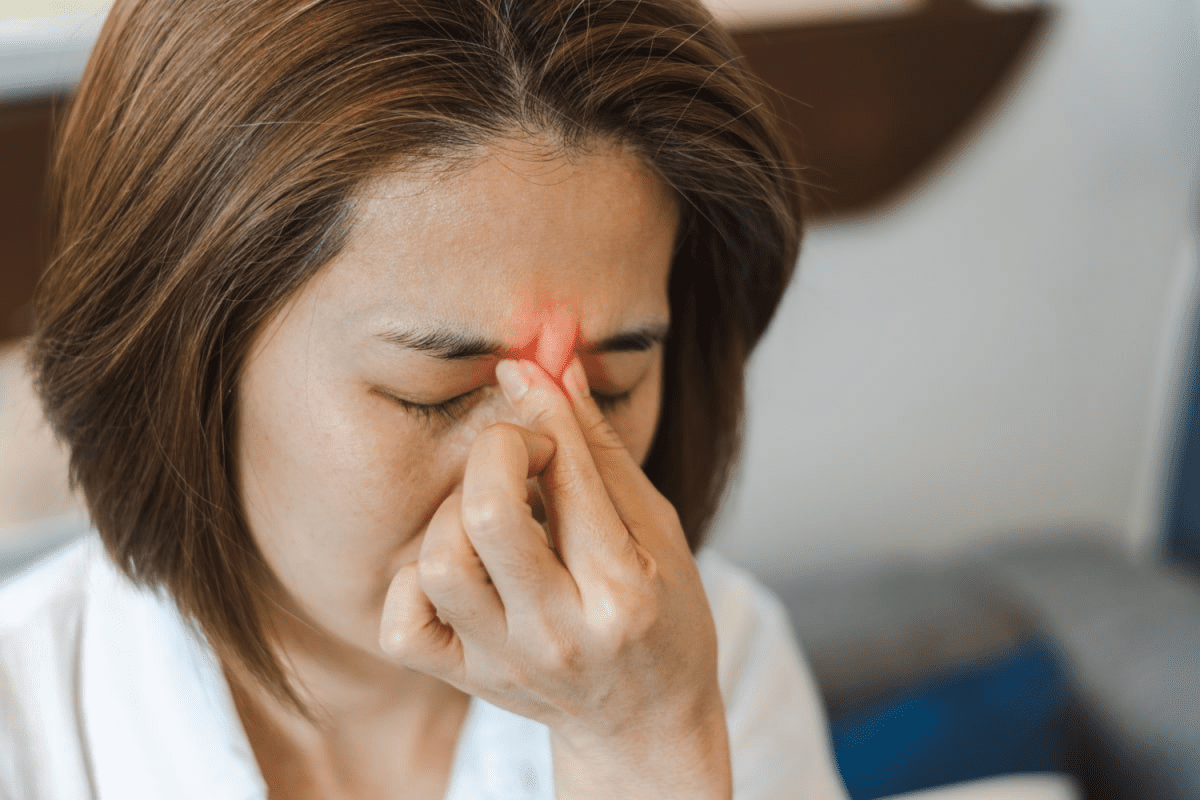
Winter is coming, and we’ll spend more time indoors. This means we’ll rely on heating systems that dry out the air. Dry sinus symptoms can be really uncomfortable and disrupt our daily lives. This is even more true for older adults, as they are more likely to have dry sinuses due to low humidity indoors.
At Liv Hospital, we know that relieving dry sinus discomfort needs a full approach. In this article, we’ll share quick solutions and tips to help you manage dry sinus symptoms. We want to give you the tools to ease your discomfort and avoid it in the future.
Quick solutions for sinus dryness symptoms, focusing on humidification and gentle moisturizing nasal sprays.

The sinuses are a complex system that, when healthy, contributes significantly to our nasal and overall health. Understanding their physiology is essential for appreciating how they function and how their health impacts our well-being.
Normal sinuses function by producing mucus that helps to keep the nasal passages moist and trap dust, bacteria, and other particles. This natural defense mechanism is critical for maintaining sinus health and overall respiratory well-being. When sinuses are healthy, they facilitate the easy flow of mucus, preventing congestion and infection.
Healthy sinuses are lined with a thin membrane that produces mucus, which is then moved by tiny hair-like structures called cilia towards the nasal passages. This process helps to clear out pathogens and irritants, maintaining the health of the sinuses and the respiratory system.
Mucus plays a vital role in sinus health by acting as a trap for dust, bacteria, and other foreign particles, preventing them from entering the lungs. It also helps to keep the nasal passages moist, reducing the risk of irritation and infection.
“Mucus is not just a waste product; it’s a critical component of our innate immune system, protecting us from infections and maintaining the integrity of our respiratory tract,” says Dr. [Last Name], an expert in respiratory health.
The characteristics of healthy mucus include being clear or white, having a thick but pourable consistency, and being produced in moderate amounts. When mucus production is abnormal, either in quantity or quality, it can indicate sinus health issues.
Characteristics | Healthy Mucus | Unhealthy Mucus |
Color | Clear or White | Yellow, Green, or Brown |
Consistency | Thick but Pourable | Too Thin or Too Thick |
Amount | Moderate | Excessive or Scanty |
Understanding the role of mucus and how normal sinuses function is critical for maintaining sinus health and preventing issues such as dry sinuses. By appreciating the physiology of healthy sinuses, we can better manage and prevent sinus-related problems.

Knowing the signs of dry sinuses is key to feeling better and avoiding more problems. Sinus dryness shows up in different ways. It’s important to know these symptoms to handle the issue well.
Pain and swelling in the sinus area are common signs. This discomfort can be a dull ache or sharp pains. It often happens in the forehead, cheeks, or around the eyes.
The swelling can make you feel congested, even without mucus.
Nosebleeds are a sign of dry sinuses. The lack of moisture can make the nasal lining crack and bleed. Also, the nose can feel irritated and raw.
In severe cases, the skin around the nostrils can crack, making things even worse.
Facial pressure is another big symptom of dry sinuses. It feels like a heavy or tight sensation in the face. This can be painful and uncomfortable.
Throat irritation and dryness can also be signs of sinus dryness. When sinuses are dry, it can irritate the throat. This can cause a scratchy or sore feeling.
Drinking plenty of water is important to help soothe the throat and ease this symptom.
By understanding and recognizing these symptoms, people can take steps to manage their sinus dryness. It’s vital to address these symptoms to avoid more problems and improve sinus health.
Dry sinuses can come from many sources. These include things we can’t control and health issues. Knowing what causes them helps us find relief.
Things around us can dry out our sinuses. Here are some main culprits:
Some health issues can make sinuses dry. These include:
Some medicines can dry out sinuses. These include:
Seasonal changes, like winter, can make dry sinuses worse. The cold air and dry indoor air are big factors. Knowing this helps us better manage dry sinuses.
Quick relief from dry sinus discomfort is possible with simple methods. Dry sinuses can really disrupt your day. Luckily, there are ways to ease your symptoms fast.
Saline nasal sprays and rinses are great for dry sinuses. They moisturize your nasal passages, thinning mucus and easing irritation. Saline solutions can be bought or made at home with salt and water.
To use a saline rinse well:
Using saline nasal sprays regularly keeps your nose moist. Always follow the product’s instructions and talk to a doctor if you’re unsure.
Steam inhalation is also effective for dry sinuses. It moisturizes your nasal passages and loosens mucus. Here are a few ways to do it:
Method | Description |
Hot Shower | Inhale the steam from a hot shower, staying in a well-ventilated area. |
Steam Bowl | Boil water, pour it into a bowl, and inhale the steam with a towel over your head. |
Humidifier | Use a humidifier in your home to maintain a comfortable humidity level. |
Be careful not to burn yourself when using steam inhalation. Adding eucalyptus oil to the water can also help by opening your airways.
Drinking plenty of water is key for sinus health. It thins out mucus and keeps your nasal passages moist. Drink at least eight glasses of water a day, more if you have dry sinuses.
Other hydrating drinks can also help:
By adding these strategies to your daily routine, you can manage dry sinus symptoms better. If your symptoms don’t get better or get worse, see a doctor for help.
Indoor heating can dry out the air, affecting our sinuses. Humidifiers add moisture to the air. This helps keep our sinuses hydrated and reduces discomfort from dry air.
There are many types of humidifiers, each with its own benefits. We can choose from:
Keeping humidity levels between 30-50% is key for sinus health. Levels below 30% can dry out sinuses. Levels above 50% can lead to mold and dust mites.
Humidity Level | Effect on Sinuses |
Below 30% | Dry sinuses, discomfort |
30-50% | Optimal for sinus health |
Above 50% | Mold growth, dust mite infestations |
Regular maintenance and cleaning of humidifiers is vital. This prevents bacteria and mold growth. We should:
By following these steps, we can keep our humidifier working well. This helps relieve dry sinus symptoms.
Natural remedies can help with dry sinus symptoms. They work well with other treatments to offer full relief.
Essential oils like eucalyptus and peppermint can help with dry sinuses. They are great for steam inhalation.
Eucalyptus oil has eucalyptol that breaks down mucus and reduces swelling. Peppermint oil has menthol that eases congestion and improves breathing.
Herbal teas like ginger and turmeric can soothe the sinuses. Drinking them often supports sinus health.
Ginger tea warms and loosens mucus. Turmeric tea has curcumin, which fights inflammation.
Eating certain foods can help with dry sinuses. Foods rich in omega-3s, like salmon and walnuts, reduce inflammation.
Drinking lots of water is also key. It keeps the nasal passages and sinuses moist.
Natural Remedy | Benefits |
Eucalyptus Oil | Decongestant, reduces inflammation |
Peppermint Oil | Eases congestion, improves breathing |
Ginger Tea | Loosens mucus, soothes sinuses |
Turmeric Tea | Anti-inflammatory, reduces sinus pressure |
Omega-3 Rich Foods | Reduces inflammation, supports sinus health |
Over-the-counter (OTC) solutions can help manage dry sinus symptoms. These products are easy to find and offer quick relief for dry sinuses.
Moisturizing nasal products, like saline sprays, are great for dry sinuses. They keep the nasal passages moist, reducing irritation. Saline sprays are effective because they mimic the natural environment of the nasal passages.
A healthcare professional notes, “Saline nasal sprays are a simple yet effective way to manage dry sinus symptoms. They are safe for long-term use and can be used in conjunction with other treatments.”
“Using saline nasal sprays has been a game-changer for my patients with dry sinuses. It’s a straightforward solution that provides immediate relief.”
For those with dry sinuses due to allergies, non-drying allergy medications are helpful. These medications control allergy symptoms without drying out the nasal passages. Antihistamines and nasal corticosteroids are examples of non-drying allergy medications that can provide relief.
Medication Type | Benefits |
Antihistamines | Effective in controlling allergy symptoms without drying out the nasal passages. |
Nasal Corticosteroids | Reduce inflammation and congestion, providing long-term relief. |
Specialized nasal lubricants provide extra moisture and comfort to dry nasal passages. These products are great for those with persistent dryness. Nasal gels and ointments are examples of lubricants that can soothe and protect the nasal mucosa.
By using these OTC solutions daily, you can manage dry sinus symptoms and feel better. Whether you choose moisturizing nasal products, non-drying allergy medications, or specialized nasal lubricants, there are many options to help you find relief.
Turning your home into a sinus-friendly space can help ease dry sinus issues. We can do this by using several methods to improve air quality and cut down on irritants.
Installing advanced air filtration systems is a top way to make your home sinus-friendly. These systems catch many allergens and irritants, like dust, pollen, and pet dander.
Key Features of Air Filtration Systems:
Feature | Description | Benefit |
HEPA Filters | Capture 99.97% of particles as small as 0.3 microns | Effective removal of allergens and irritants |
Activated Carbon | Absorbs gases, odors, and chemicals | Reduces volatile organic compounds (VOCs) |
UV Light Technology | Kills bacteria, viruses, and other microorganisms | Enhances overall air quality |
It’s key to cut down on indoor allergens for a sinus-friendly home. Regular cleaning, allergen-proof bedding, and less clutter can help a lot.
Tips for Reducing Indoor Allergens:
Some indoor plants can make the air better and help your home be more sinus-friendly. Plants like peace lilies and spider plants are good at removing toxins and allergens from the air.
Some groups, like older adults, children, and those with chronic conditions, have special needs for dry sinus relief. They might need custom solutions based on their health and age.
Older adults often struggle with dry sinuses because of changes in their nasal tissues and less mucus. We suggest they use soft, non-irritating nasal products and humidifiers to keep their noses moist.
Children with dry sinuses need special care to ensure their relief methods are safe and work well. We suggest talking to a pediatrician to find the best solution for your child.
Key considerations for children:
People with chronic conditions like Sjogren’s syndrome or autoimmune disorders often have worse dry sinus symptoms. It’s important to manage these conditions well to help with dry sinuses.
We recommend that individuals with chronic conditions:
Understanding the unique challenges of vulnerable populations helps us offer better relief for dry sinuses. It’s key to tailor treatments for older adults, children, and those with chronic conditions.
Knowing when to get medical help is key to managing dry sinus symptoms. Many cases can be treated with self-care and over-the-counter remedies. But, some situations need a doctor’s evaluation.
Some symptoms show you might have complications that need quick medical help. These include:
If you have any of these symptoms, see a healthcare professional:
Sometimes, dry sinus symptoms can hide an underlying condition. These may include:
If you’re unsure about your dry sinus symptoms or they’re affecting your life, see a doctor.
Chronic sinus dryness can be managed with various medical treatments. If simple steps don’t help, doctors might suggest more serious treatments. These aim to fix the root cause and ease symptoms.
Prescription medications are key for many with chronic sinus dryness. Corticosteroid nasal sprays reduce swelling and aid healing. Antibiotics might be needed if a bacterial infection is causing the dryness.
We also look at other options like antihistamines or decongestants. These depend on the patient’s symptoms and health history.
In-office procedures are a gentle way to treat chronic sinus dryness. Nasal irrigations with saline solutions moisturize the nasal passages and clear out debris. Sinus debridement removes infected or damaged tissue in some cases.
In severe cases, surgical interventions might be needed. Procedures like turbinate reduction or septoplasty can improve airflow and reduce dryness. We discuss the benefits and risks with patients to choose the best option.
It’s vital to tackle the root causes of chronic sinus dryness. If allergies are involved, we might suggest allergy testing and treatment. Managing autoimmune disorders or other health issues is also key to easing symptoms.
Treatment Option | Description | Benefits |
Prescription Medications | Corticosteroid nasal sprays, antibiotics, antihistamines | Reduce inflammation, treat infections, alleviate allergy symptoms |
In-Office Procedures | Nasal irrigations, sinus debridement | Moisturize nasal passages, remove debris and infected tissue |
Surgical Interventions | Turbinate reduction, septoplasty | Improve nasal airflow, reduce dryness |
Treatment for Underlying Causes | Allergy testing and treatment, management of autoimmune disorders | Address root causes, alleviate symptoms |
Managing dry sinuses needs a mix of strategies to tackle the root causes. Understanding what causes dry sinuses helps people take action. This can greatly improve their life quality.
We’ve looked at ways to handle dry sinuses, like using saline sprays and humidifiers. Making your home a sinus-friendly space is also key. This includes using air filters and reducing allergens indoors.
Keeping your sinuses healthy is a continuous effort. It’s about keeping humidity right, drinking plenty of water, and avoiding things that irritate your sinuses. By doing these things, you can see big improvements in your sinus health.
By sticking to these methods, you can lessen the pain of dry sinuses. This leads to better health overall. We urge readers to actively manage their dry sinuses. There are many ways to find lasting relief.
Symptoms include pain, inflammation, nosebleeds, and nasal irritation. You might also feel facial pressure and throat discomfort. Knowing these signs helps you manage your condition better.
Dry sinuses can come from many sources. These include environmental factors, medical conditions, and side effects from medication. Seasonal changes also play a role. Finding the cause is key to the right treatment.
Use saline sprays and rinses, and try steam inhalation. Drinking lots of water also helps. These steps can ease your symptoms right away.
Humidification is vital, more so in winter. Keeping humidity at 30-50% helps keep sinuses moist. This is important for managing symptoms.
Yes, natural remedies can help. Essential oils like eucalyptus and peppermint, and herbal teas like ginger and turmeric are effective. Eating foods rich in omega-3 fatty acids also helps.
You can find moisturizing nasal products and non-drying allergy meds. There are also specialized nasal lubricants available over-the-counter.
Use air filtration systems and reduce indoor allergens. Adding beneficial indoor plants can also make your home better for your sinuses.
Yes, older adults, children, and those with chronic conditions need extra care. They might need guidance on safe relief methods or need to see a doctor.
Seek medical help for severe pain, fever, or trouble breathing. If symptoms get worse or last too long, it’s a sign of something serious.
Treatments include prescription meds like corticosteroids. You might also need in-office procedures or surgery. Treating the cause is important.
Yes, they can signal conditions like allergies or autoimmune disorders. It’s important to treat the root cause for effective management.
To prevent dry sinuses, keep your home environment friendly to your sinuses. Use humidifiers, stay hydrated, and avoid irritants. These steps can help prevent symptoms.
Centers for Disease Control and Prevention. (2022). Sore Throat. Retrieved from https://www.cdc.gov/antibiotic-use/community/for-patients/sore-throat.html
Subscribe to our e-newsletter to stay informed about the latest innovations in the world of health and exclusive offers!
WhatsApp us